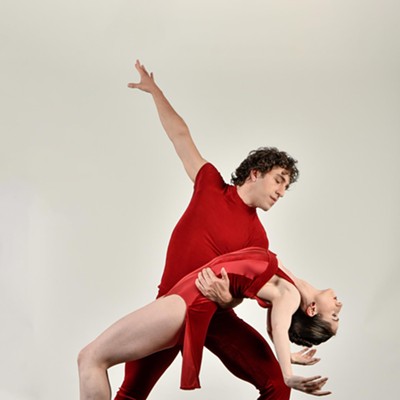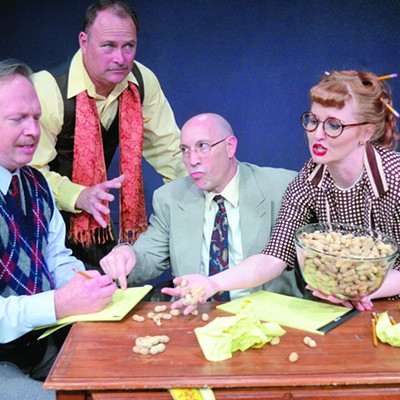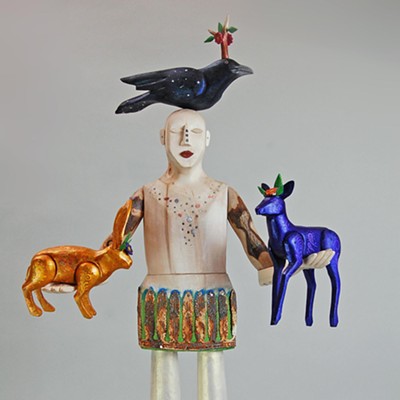Incremental Enlightenment
AHS Summer Lecture Series7 p.m. Wednesday, July 28
Arizona Historical Society Museum
949 E. Second St.
628-5774
In typing up each issues' calendar listings, I've seen no series that hits as hard every week in terms of quality and comprehensiveness as the AHS' Summer Lecture Series: Traditions and Transitions of the American Indian.
"We wanted to get folks who represented a variety of the different tribes," says Gwen Harvey, director of the Education Department for AHS. "The main idea of the series is to talk about not only traditional culture, but also ... how many Indian cultures have adapted to being in today's world in various ways. A lot of the lectures deal with self-identity--that's not how it was planned, but that's how it fell in over time."
The series began July 7 with a discussion of the Camp Grant massacre. On July 14, Dolores Flores of the Pascua Yaqui Alternative Medicine Program discussed the preparation and use of native herbs in traditional Yaqui medicine. On July 22, Yoeme Cultural Specialist Felipe Molina spoke about the history and oral traditions of Yoeme homelands in Arizona and Mexico.
Future lectures will include: "Photographing the Diné (Navajo)," by Dr. Nancy Parezo; "History of the Tucson Indian Center: Urban Survival and the Search for Identity," by Tucson Indian Center Executive Director Jacob Bernal; And "We are Losing Geronimo's Language," by Apache Cultural Preservationist Edgar Perry.
Introduce yourself to the series at 7 p.m. Wednesday, with "Tohono O'odham Calendar Stick: Us Hikbina--The Future of Our Past," presented by Mary Cathleen Garcia of the UA Native American Research and Training Center. Lectures are $6 ($5 for AHS members and $3 for students); doors open at 6:30 p.m.
Pick the Town Clean
Greg Morton Concert to Benefit "Keep It Clean"8 p.m. Saturday, July 24
Flash Gallery
312 E. Congress St.
820-0903
Keep It Clean, the political action committee whose focus it is to protect Arizona's Clean Elections law, knows how to raise money. They're not just effective--having raised $178,737 (The Skinny, July 8) since the organization's inception to fight the seductively named No Taxpayer Money for Politicians initiative--they have the good sense to hold fund-raisers in cool places.
This Saturday's Flash Gallery event kicks off at 7 p.m.; $5 gets you in the door, and another $5 buys you "a heaping plate of Mexican food." At 8:45 p.m., Greg Morton--2004 TAMMIES winner in the "Best Bluegrass Band" category and the reason this blurb has the "Music" header--takes the stage.
Morton is known for his award-winning picking; performances with musicians such as John Hartford, Dan Crary, The Dillards and Buck White and the Down Home Folks (later known as The Whites of O Brother Where Art Thou? fame); as well his self-released album, Solo Guitar. He won the Arizona State Guitar Championship in 1995 and picked up additional TAMMIES for Best Acoustic Guitarist in 2001, 2002 and 2004. (As if that's not enough, Morton was, at one point, a member of Don Ho's band in Honolulu, Hawaii.) His second album, When Pigs Fly, is scheduled to be released in the fall of 2004. Bluegrass musician Matt Cordes opens for Morton at 8 p.m.
For more information about the event, call Flash Gallery at the above number. For more information about Keep It Clean, call 622-2871 or log on to azkeepitclean.org.
Salvation, Unlimited
"River of Words" Winners ExhibitSaturday, July 24 through Aug. 15
Arizona-sonora Desert Museum
2021 N. Kinney Road
883-2702
It's almost impossible to say the words "the children are our future" without wincing at the cliché; it's also impossible to deny that the statement is true.
The River of Words Contest--an international poetry and art contest for young people ages 5 to 19--does a great job of getting kids to think about and connect to their environment, which may, in the end, do more to protect and resuscitate our environment than teaching activism at a young age ever could.
Take, for example, the first few lines of 8-year-old Tucsonan Tyler Mitchell's poem, which went on to win the international poetry contest for his age group last year: "The rain, the trees / the road and my heart / are part of the world." If we can raise a generation that feels that kind of kinship with their surroundings, there may be hope for Earth after all.
River of Words, in association with The Library of Congress Center for the Book, focuses on watersheds, which makes the art and writing of contestants in Southwest communities such as Tucson all the more poignant. Poetry submissions are judged by writer Pamela Michael (co-author of several books in the "Travelers' Tales Guides") and 1995-1997 U.S. Poet Laureate Robert Hass; art entries are judged by children's book writer and illustrator Thacher Hurd (Art Dog, Cat's Pajamas).
The art and poetry of this year's Tucson winners goes on display at the Arizona-Sonora Desert Museum's Ironwood Gallery on Saturday, July 24; the exhibit runs through Aug. 15.
You're an Animal
Tracking Class8 a.m. to 1 p.m. Sunday, July 25
Rose Canyon Lake Amphiteatre
Mount Lemmon
975-7226
When facing wilderness, we humans have few tools left. We've shed our fur, lost our tails and softened the soles of our feet; our opposable thumbs--those triumphs of evolution--are fragile, and frequently used to grab for asthma inhalers. We are, however, still animals, and the refinement that keeps us at the top of the food chain (and allows us to genetically modify it) is our fleet of squiggly, booming brains.
Use that brain to get back to basics--learn to identify different kinds of tracks and whether the creature that left them was male or female.
"As you learn to track animals," says Andrew Ford of the Outdoor Traditions Tracking Guild, "you learn much more about the animal itself. The more time you spend tracking, the more you tend to see the landscape through the animal's eyes; you almost become that animal as you're following its trail. You start to see it from their perspective; to understand where they're going and why they're going there."
Ford says Outdoor Traditions began about two years ago, "to enhance people's outdoor activities ... get them connected to the environment, animals and local ecology." They've hosted classes in hiking, bird language and navigating without mechanical devices, but focus on tracking because "it also informs you about plant life, weather, mammals and birds," says Ford. "It's the focal point of our program because it leads to all these other areas of information."
The class is free, but reservations are recommended.







